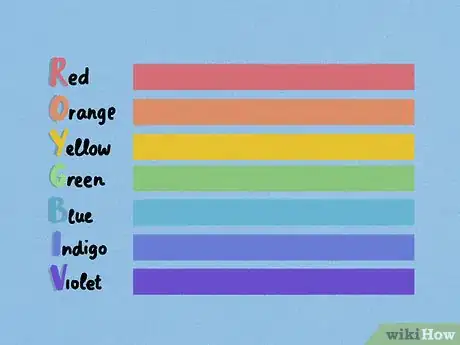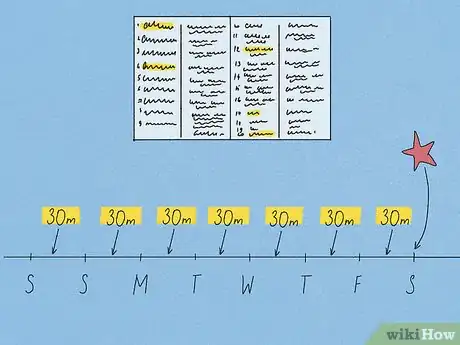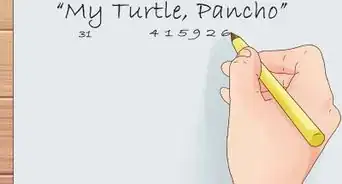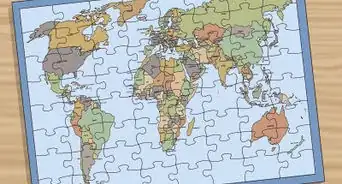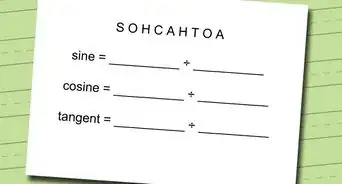This article was co-authored by Ted Coopersmith, MBA. Ted Coopersmith is an Academic Tutor for Manhattan Elite Prep, a test prep and academic tutoring company based in New York City. In addition to general academic advising, Ted has expertise in preparing for the ACT, SAT, SSAT, and ASVAB tests. He also has over 30 years of financial controller advising and consulting experience. He holds a BA from the City University of New York (CUNY) and an MBA from Pace University.
There are 15 references cited in this article, which can be found at the bottom of the page.
wikiHow marks an article as reader-approved once it receives enough positive feedback. This article has 56 testimonials from our readers, earning it our reader-approved status.
This article has been viewed 3,011,286 times.
Whether you have to memorize a long list of vocabulary words for a test, several lines for a play, or anything else, there are several ways to make the process easier. Start by priming your brain with strategies that boost memorization. Then, use effective techniques to memorize the material. You can use additional strategies to help you master the information.
Steps
Using Effective Memorization Strategies
-
1Use an acronym to help you remember words in a specific order. An acronym is a type of mnemonic device in which the first letter of each word in a word, phrase, or sentence corresponds to something you want to memorize. You can create your own acronym to help you remember words in a specific sequence, or simply to remember a group of words.[1]
- For example, “Please Excuse My Dear Aunt Sally.” This mnemonic is often used to help people remember the order of operations for solving algebra problems. P stands for parentheses, E-exponents, M-multiply, D-divide, A-add, and S-subtract in the sentence.
- A popular mnemonic device in the musical world is Every Good Boy Deserves Fudge, which stands for the notes in the treble staff: EGBDF.[2]
- The fake name acronym ROY G BIV has long helped people remember the colours in the rainbow: Red, Orange, Yellow, Green, Blue, Indigo, and Violet.[3]
- Math uses the acronym PEMDAS for remembering orders of operations, while English grammar uses FANBOY as a memory tool for conjunctions.[4]
-
2Assign an image to what you need to memorize. Associating an image with a word or concept is another powerful way to commit it to memory.[5] Try taking an interesting image and look at it often as you read the material you want to memorize. This can also be very helpful for memorizing people's names.[6]
- If you need to memorize the names of 5 coworkers you have just met, think of an image that you can associate with each person's name.
- For example, you could associate Charlie with the image of the cartoon character Charlie Brown, Michael with an image of the archangel Michael, Cindy with iconic supermodel Cindy Crawford, Donna with a 50s doo-wop singer, and Herbert with a bowl of sherbet.
Advertisement -
3Talk out loud as you study. Reading information out loud, explaining concepts to yourself, or even just making the occasional comment to yourself as you work can help to solidify the information that you are studying. Try talking to yourself as you study the material that you need to memorize.[7]
- If you are studying in a library, then make sure that you are in a section where some noise is permitted.
-
4Make your own flashcards and study them daily. Flashcards are a classic memorization tool. Write the concept, cue, or subject on 1 side of the card, and then write the definition, line, or other details you need to memorize on the other side. Make sure all of the flashcards are facing in 1 direction in your stack and go through the pile. Look at the concept or cue side first and see if you can recall the definition or line on the other side. If not, read it a few times to commit it to memory. Then, move on to the next card.[8]
- Continue through the pile in this manner to memorize the information.
Tip: When you are studying, make sure to vary the types of information you study. For example, you might study vocabulary words for 20 minutes, then change gears to solving practice math problems for another 20 minutes, and then switch over to reading material in a textbook. This is an effective strategy for maintaining focus.[9]
-
5Write a summary for each paragraph to understand it better. As you read the material that you want to memorize, write a summary of each of the paragraphs you read. Write the summary in your own way of speaking to help you retain the information. This will help you to gain a basic understanding of the material and you may even memorize some key terms and concepts in the process.[10]
- For example, after reading a paragraph on how the heart pumps blood, explain it to yourself briefly in 1 to 2 sentences.
-
6Compartmentalize the information into smaller chunks. It is difficult to memorize long strings of numbers and words, such as identification numbers or lines in a play. If you need to memorize a large amount of material, break it down into more manageable chunks to make it easier on yourself. Some ways you can do this include:[11]
- Color-coding your notes by topic.
- Memorizing a 3 to 4-word phrase or 3 to 4 numbers at a time.
- Focusing on the key terms in 1 paragraph or page in a textbook.
-
7Try rhyming mnemonic devices to remember dates and other facts. Your brain may find it easier to remember certain facts if you put them into the form of a rhyme. Choose a date, fact, or other important detail that you need to memorize. Then, choose a word that rhymes with it and create a short rhyming sentence. Some popular rhyming mnemonic devices include:[12]
- In fourteen hundred ninety-two, Columbus sailed the ocean blue.
- Thirty days has September, April, June, and November.
-
8Write the information out over and over again. Hand-writing is a powerful tool for memorization, and it is even more effective if you do it repeatedly. Get out a pen and paper and start hand-writing what you need to memorize. You can write out your lines for a play, definitions for key terms, math equations, or whatever it is you need to commit to memory.[13]
- If you prefer, you can also record yourself reading the information and then listen to the recording repeatedly. This is a good option if you have a log commute or if you just learn better by hearing things.
Making the Information Stick
-
1Relate the information to something you already understand. Choose a topic that interests you and that you understand very well. Then, find a way to relate the information you need to memorize to the subject you already understand.[14]
- For example, you could relate the material you need to memorize for a math test to the rules of baseball if you are a sports fan, or use a cooking analogy to help you remember a chemistry concept if you are a fan of cooking.
-
2Memorize the information over several days or weeks. The sooner you start memorizing, the better! It takes time and repetition to memorize something. Plan to begin memorizing the material at least 1 week in advance, and even sooner if possible. Work on memorizing the material for a set amount of time every day. The time you will need will vary depending on the amount of material you need to memorize.[15]
- For example, if you need to memorize 20 new vocabulary words for a test, then you might only need to study for 30 minutes per day over the course of a week.
- However, if you need to memorize lines for a leading role in a play, then you will need to start memorizing 3 to 4 weeks in advance and plan to study your lines for at least an hour daily.
-
3Quiz yourself on the material you have studied. You might find the material familiar when you re-read it and think that this means you have memorized it. However, this is not an accurate way to check for memorization. Self-testing is better for seeing how well you are retaining the material. Try to recall the information without looking at your notes. If you can recall the information accurately without help, then you have memorized it.[16]
- For example, if you need to be able to explain photosynthesis for a science test, then see if you can do this without checking your notes first.
- If you need to be able to recite a poem from memory, then try to recite it.
-
4Teach other people what you have learned. Teaching other people the material that you have studied is another potent way to commit it to memory. After you have studied the material and feel that you have a good understanding of it, try to explain it to a friend or family member. If you can do this without checking your notes, then you have memorized the information.[17]
Tip: If you enjoy teaching others, you might consider working as a tutor. This is a great way to help other people learn and solidify the concepts in your own mind as well.
Priming Your Brain for Memorization
-
1
-
2Drink a cup of green tea before you start memorizing. Green tea has been show to boost cognitive function more than other types of beverages. Make yourself a cup of regular or decaf green tea and sip it before or during your study session. The extra boost of caffeine in regular green tea may also be helpful.[21]
- You can drink green tea hot or iced.
-
3Create an environment that is free from distractions. Avoid multitasking while you memorize, such as checking your social media accounts or texting friends. This will interfere with your ability to focus on the task at hand. Put away your phone, turn off the TV, and ask members of your household not to disturb you while you are studying.[22]
- If you have trouble staying focused, try setting small goals and rewarding yourself with a short break each time you meet one of them. For example, you could make it your goal to focus on studying for 25 minutes, and then reward yourself with a 5 minute break.
Tip: Check out apps for avoiding distractions. You can download an app that will reward you for not checking social media or other outlets on your phone, such as by creating an interesting animation the longer you go without closing the app.
-
4Plan to memorize in the afternoon rather than in the morning or evening. Afternoon may be the time when you feel the least alert, but it has also been shown to be a potent time to work on memorizing new information. If you have been struggling to remember the material you are studying, try memorizing it in the afternoon instead of in the morning or at night.[23]
- For example, you could work on memorizing at around 2 or 3 pm.
-
5Get a good night of sleep before you start memorizing. Being well-rested has a far-reaching impact on your ability to memorize. To give yourself the best possible chance of retaining information, go to bed early enough to get a full 8 hours of sleep.[24]
- Try going to bed a little earlier than you normally do, such as 10:00 pm if you normally got to bed at 10:30 pm.
- Make your bedroom a relaxing space that you only use for sleep. Don't work, eat, or do other daytime activities in your bedroom.
Community Q&A
-
QuestionHow do I study for a test that I have tomorrow?
 Community AnswerYou can try repetition with the term and definition, which should help. Also, make sure you take a break every 30 minutes or so, because your brain can't handle so much information at once. The break will allow your brain to refresh in order to process the information that you are studying.
Community AnswerYou can try repetition with the term and definition, which should help. Also, make sure you take a break every 30 minutes or so, because your brain can't handle so much information at once. The break will allow your brain to refresh in order to process the information that you are studying. -
QuestionHow can I memorize something in one hour?
 Community AnswerKeep writing it out on a whiteboard. Take certain words out at a time to see if you can remember them words. When you're ready, rub out all the words and try write them all out by memory.
Community AnswerKeep writing it out on a whiteboard. Take certain words out at a time to see if you can remember them words. When you're ready, rub out all the words and try write them all out by memory. -
QuestionWhich is the fastest and easiest method for memorization?
 Community AnswerRepetition. If you have terms and definitions, do either terms and answer with definitions first, or definitions first and answer with the correct term.
Community AnswerRepetition. If you have terms and definitions, do either terms and answer with definitions first, or definitions first and answer with the correct term.
References
- ↑ https://learningcenter.unc.edu/tips-and-tools/enhancing-your-memory/
- ↑ https://thebrain.mcgill.ca/flash/capsules/outil_bleu04.html
- ↑ https://www.scientificminds.com/blog/whatever-happened-to-roy-g-biv-kathy-reeves-115.aspx
- ↑ Ted Coopersmith, MBA. Academic Tutor. Expert Interview. 10 July 2020.
- ↑ Ted Coopersmith, MBA. Academic Tutor. Expert Interview. 10 July 2020.
- ↑ https://www.psychologytoday.com/us/blog/happiness-in-world/200911/eight-ways-remember-anything
- ↑ https://learningcenter.unc.edu/tips-and-tools/enhancing-your-memory/
- ↑ https://usm.maine.edu/agile/using-flashcards
- ↑ https://learningcenter.unc.edu/tips-and-tools/enhancing-your-memory/
- ↑ https://www.psychologytoday.com/us/blog/happiness-in-world/200911/eight-ways-remember-anything
- ↑ https://www.psychologytoday.com/us/blog/happiness-in-world/200911/eight-ways-remember-anything
- ↑ https://medicine.llu.edu/academics/resources/using-mnemonic-devices-make-memorization-easier
- ↑ https://www.snexplores.org/article/handwriting-better-for-notes-memory-typing
- ↑ https://www.psychologytoday.com/us/blog/happiness-in-world/200911/eight-ways-remember-anything
- ↑ https://learningcenter.unc.edu/tips-and-tools/enhancing-your-memory/
- ↑ https://learningcenter.unc.edu/tips-and-tools/enhancing-your-memory/
- ↑ https://learningcenter.unc.edu/tips-and-tools/studying-101-study-smarter-not-harder/
- ↑ https://www.health.harvard.edu/blog/regular-exercise-changes-brain-improve-memory-thinking-skills-201404097110
- ↑ http://www.ncbi.nlm.nih.gov/pubmed/23795769
- ↑ https://www.academia.edu/3145421/The_Acute_Effects_of_Yoga_on_Executive_Function
- ↑ https://www.helpguide.org/articles/healthy-living/how-to-improve-your-memory.htm
- ↑ https://www.ncbi.nlm.nih.gov/pmc/articles/PMC4114291/
- ↑ http://www.scielo.br/pdf/bjmbr/v41n6/7019.pdf
- ↑ https://www.psychologytoday.com/us/blog/happiness-in-world/200911/eight-ways-remember-anything
About This Article
To memorize something, figure out what learning style works best for you. You can be an auditory, visual or tactile learner. If you’re more of an auditory learner, try repeating whatever it is you want to memorize out loud to yourself over and over again. Or, you can listen to a recording of it on repeat. Alternatively, if you're a visual learner, try creating images using the information you’re trying to memorize, or rewriting your notes several times. You can also color code a hard copy of the information using highlighters so it’s easier to learn. On the other hand, if you're a tactile or kinesthetic learner, try using physical objects, like flashcards, stickers, and paper cut-outs. Additionally, you can act out whatever it is you’re trying to memorize so it sticks in your mind better.
